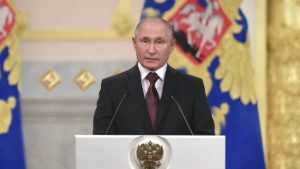In a bold move, Russian President Vladimir Putin has announced an updated nuclear doctrine, significantly lowering the threshold for the use of nuclear weapons. This announcement follows reports that the Biden administration allowed the use of American missiles in Ukrainian strikes within Russian territory. The new doctrine, titled "The Basics of State Policy in the Field of Nuclear Deterrence," expands the scenarios under which Russia could respond with nuclear force, suggesting a possible shift in global military dynamics.
**Putin's Nuclear Doctrine Update Signals Rising Tensions with the West**

**Putin's Nuclear Doctrine Update Signals Rising Tensions with the West**
Russia's President Vladimir Putin reveals a revised nuclear strategy that increases the likelihood of deploying nuclear weapons, as tensions with the U.S. and NATO escalate.
The updated policy introduces a wider spectrum of threats, declaring that Russia may resort to nuclear weapons if conventional aggression threatens its or Belarus' sovereignty. This marks a departure from the previous focus on nuclear retaliation and existential threats. Notably, the new guidelines classify joint attacks—any conventional assault by a non-nuclear power with backing from a nuclear state—as sufficient grounds for a nuclear response. Moreover, it includes mass aerospace strikes that breach Russian borders.
The Kremlin emphasizes that aggression from any non-nuclear state, when supported by a nuclear power, constitutes a joint attack and could provoke a serious military reaction from Russia. The document implies a unified response to any coalition against Russia or its allies, reinforcing Moscow's intent to deter Western involvement in its regional affairs, particularly amid the ongoing conflict in Ukraine.
This escalation in Russia's nuclear posture could drastically alter how Western leaders approach military and diplomatic strategies in a more perilous geopolitical landscape. As the nature of threats evolves, the risk of miscalculation looms large, complicating efforts to maintain global stability. Putin's announcement raises vital questions for future diplomatic dealings and strategic engagements between Russia and the West as both sides navigate these treacherous waters.
The Kremlin emphasizes that aggression from any non-nuclear state, when supported by a nuclear power, constitutes a joint attack and could provoke a serious military reaction from Russia. The document implies a unified response to any coalition against Russia or its allies, reinforcing Moscow's intent to deter Western involvement in its regional affairs, particularly amid the ongoing conflict in Ukraine.
This escalation in Russia's nuclear posture could drastically alter how Western leaders approach military and diplomatic strategies in a more perilous geopolitical landscape. As the nature of threats evolves, the risk of miscalculation looms large, complicating efforts to maintain global stability. Putin's announcement raises vital questions for future diplomatic dealings and strategic engagements between Russia and the West as both sides navigate these treacherous waters.






















